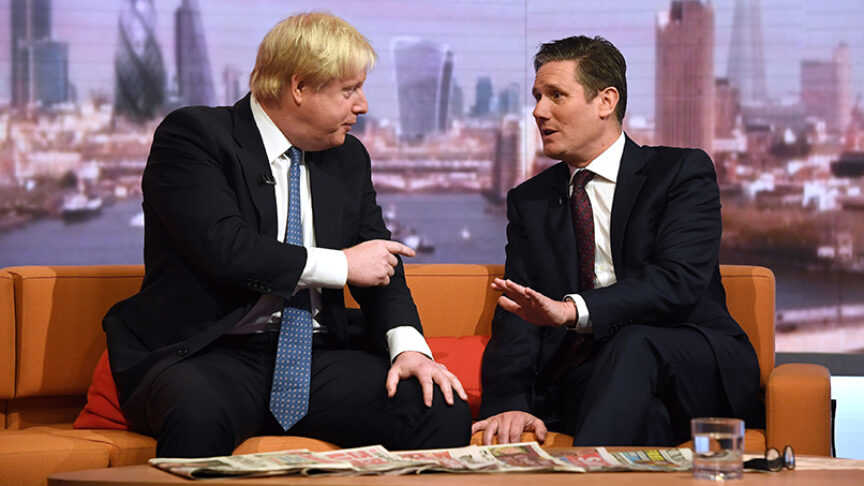The Brexit parenthesis: Three ways the pandemic is changing UK politics
Summary
- The shock of covid-19 in Britain may end the culture-wars politics set off by the Brexit referendum – which split the country between Leave and Remain, town and city, old and young.
- Many people had lent their votes to Boris Johnson’s Conservatives for cultural reasons, in spite of the fact that they were closer to the opposition Labour Party on economic issues. Covid-19 might cause a rethink, as voters expect competence from the government.
- Counterintuitively, both Leavers and Remainers are open to a leftist domestic agenda and greater cooperation with international partners – issues on which Labour is normally strong.
- Covid-19 has caused voters to take a dimmer view of previously touted post-Brexit trade partners like the US and China. They think more highly of countries such as Germany.
- The battleground will be ‘Red Wall defectors’ – voters who gave Johnson his 2019 general election landslide but who are reassessing what matters to them after Brexit.
- A politics divided along the lines of Leavers and Remainers could disappear as quickly as it appeared – but the Conservatives may nevertheless attempt to stoke the divisions of 2016 that secured them Brexit.
Introduction
Covid-19 has the potential to be a political game-changer in the United Kingdom of the magnitude of the Brexit referendum. Just as many commentators expected British politics in the 2020s to organise around Brexit tribes – with the Conservatives representing socially conservative voters in towns and the countryside, and Labour becoming the party of metropolitan graduates and ethnic minorities – the pandemic and its aftermath could completely reshape the British political landscape.
The government’s management of covid-19 could prompt a rethink by voters who worry about its competence under Boris Johnson. The crisis has also led voters to focus on pragmatic international cooperation and redistributive economic policies. All this has set the scene for a potential blurring of cultural divisions between Brexiteers and Remainers as the health crisis is followed by a potentially even more devastating economic one.
The big fight in the next few years is likely to be between a Conservative Party that wants to repolarise the country through culture wars and a Labour Party that wants to de-escalate those divisions and appeal to the internationalist and economic values of the electorate. These are some of the findings in a major opinion poll of 2,000 voters commissioned by ECFR to explore how the coronavirus has changed Britons’ attitudes to the world, Europe, and the state. They show that the pandemic could be an inflection point that – paradoxically – restores a certain normality to politics even in these most abnormal of times.
The UK’s double disruption
Politics in Britain has transformed over the last decade. The referendum on the country’s membership of the European Union in 2016 triggered a process of polarisation in society that initially cut across the British party landscape – and ended up gradually remaking it. At the 2019 general election, the UK’s two-party system reflected the cultural divides in the country: the Conservative Party appeared to have become the organised wing of the Vote Leave campaign while Labour fared best in the most pro-Remain parts of the country. Labour’s April 2020 choice of metropolitan Remainer Keir Starmer as party leader, replacing the Eurosceptic Jeremy Corbyn, seemed to confirm this trend. To all intents and purposes, a dramatic realignment of British politics had taken place.
The first effect of the covid-19 crisis was to reinforce these pre-existing trends. Initially, the country rallied round the flag, not least when the prime minister himself fell ill with the virus, a development that allowed Johnson to cement his reputation as a champion of the National Health Service (NHS). His determination to leave the EU by the end of January and quickly follow up with a generous budget before the eventual lockdown – supposedly possible because of a boost provided by Brexit – then underlined the government’s commitment to addressing the concerns of “left behind” voters in Red Wall seats. These crucial seats were the ones that gave Johnson a landslide parliamentary majority of 80 and comprised former Labour constituencies largely in the English north and Midlands that voted Conservative in 2019 – in many cases, for the first time in decades.
This ‘northern strategy’ pursued by Johnson to win the election has deep parallels with Richard Nixon’s ‘southern strategy’ of using culture to scramble the traditional economically driven political identity of many voters. Various studies have shown that voters are closer to the Labour Party than the Conservatives on economic values, and closer to the Conservatives on social and cultural ones. The referendum result came about because voters prioritised culture over economics. It created new voter identities that forced parties to reorganise themselves in 2019, as seen in events such as Johnson’s brutal purging of holdout Remainer MPs. Just as he vowed to “Take Back Control” in the referendum campaign, in the election campaign he promised to “Get Brexit Done” – and it worked.
Johnson’s government was not unaware of the importance of having an economic agenda for Leave supporters. Even before the pandemic, it was apparent that finally leaving the EU would inevitably make the Brexit dividing line a wasting asset in any prolonged culture-wars campaign – and could even become a negative if things went badly wrong. And so the government’s strategists prepared an early strategy to win the trust of voters who had ‘lent’ their votes to secure Brexit by January and keep Corbyn away from 10 Downing Street. The ‘levelling up’ agenda the Conservatives presented at the general election and the subsequent March budget was a platform of investment in infrastructure, the NHS, and tackling regional inequality. It aimed to accompany ongoing tough messages on Brexit, immigration, and crime designed to appeal to the conservative social values of the Conservative Party’s new voters. The party continued to pursue this twin approach even amid a pandemic, offering up a combination of economic and cultural messages. But in the summer of 2020, while covid-19 supports some elements of the ‘levelling up’ strategy, the assumptions that underpin the cultural strand of this approach, in particular, are coming under pressure.
Covid-19 could now be pushing new issues to the fore that cut across previous Brexit identities and force a reassessment of their relative importance. In this volatile post-Brexit environment Johnson’s management of the crisis risks becoming his version of John Major’s “Black Wednesday” in 1992. This was an event that so totally transformed perceptions of the Conservative government’s competence on economic issues that it opened the way for political realignment in which Labour seized the agenda on both culture and the economy.
For many voters now, the pandemic could thus change some of the calculations they made at the referendum. Political scientists increasingly use the concept of “cross-pressured voters” to explain how a change in the political context can force voters to reassess the relative importance of different factors in their lives. The insight of this concept is that an event like covid-19 can push political issues up the agenda that cut across voters’ existing partisan identities. In the current UK context, this may mean a voter weighs up supporting Brexit with also wanting more cooperation with EU states or being more open to immigration. This will eventually force a realignment as cross-pressured voters resolve their internal contradictions. This realignment can be driven by party strategies or external events. If parties manage to reposition themselves or frame certain issues differently, then they can capture voters in this new alignment.
The danger of this for the Conservatives lies at least in part in covid-19’s unique feature as the first ‘global domestic’ crisis, in which a country’s national response can be readily compared to every other country in the world. All the sentiments of ‘British exceptionalism’ that have defined so much of the UK’s politics in recent years have come under scrutiny, as innumerable charts and tables show that the country’s government has performed less well at containing the virus than any other in Europe.
This danger is confirmed by ECFR’s polling, which presented respondents with nine options about who was most to blame for the loss of British lives: the UK government, the Chinese government, people not following the rules, or people returning to the UK. The largest group of respondents believe the UK government to be primarily responsible: 32 per cent of all respondents hold this view, and a majority of those who support opposition parties do – although only 6 per cent of Conservative Party supporters blame their chosen party.
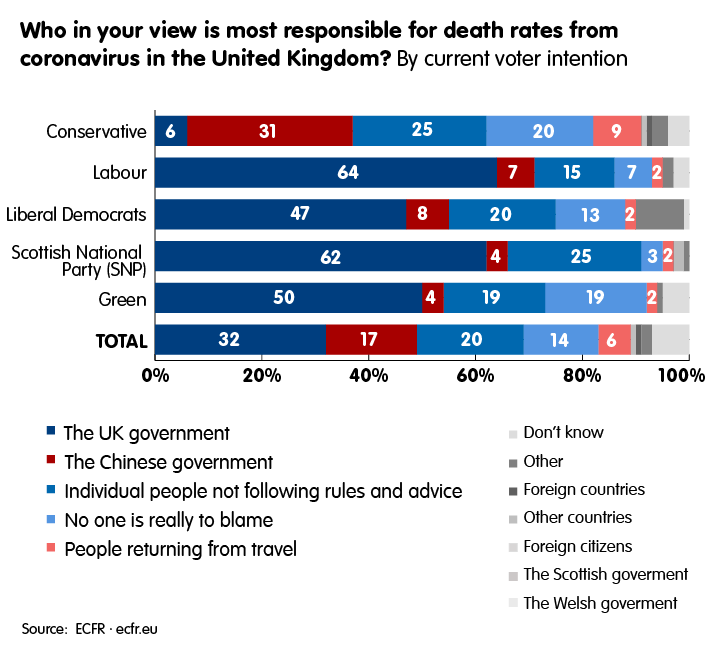
Overall, the findings also suggest that people’s faith in experts is linked to their faith in political parties as much as the other way around. If the government wants to point the finger of blame at experts, it may not get much of a hearing. Fifty per cent of all respondents believe that, when the government says it is “following the scientific advice”, it is only doing so for political reasons; or that it is not really following it. Only one-third believe it is following scientific advice in good faith.
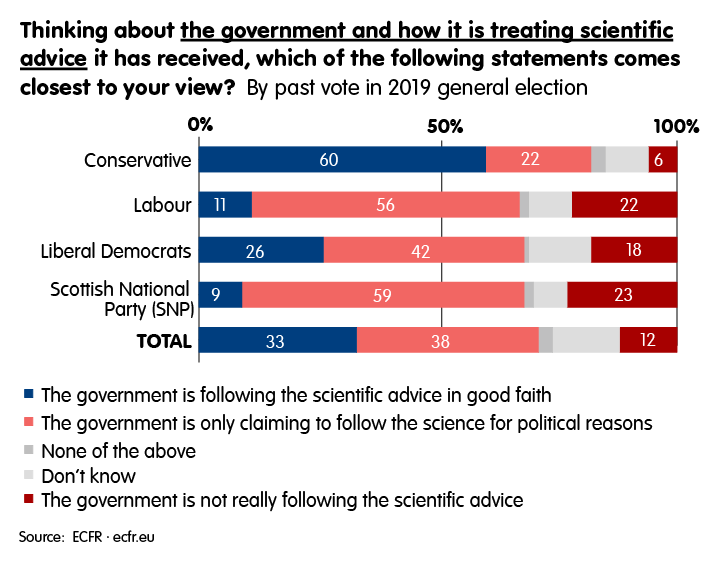
There is a notable contrast between developments in Britain and those in the rest of Europe. A pan-European survey conducted by ECFR shortly before the UK poll found that, in most countries, covid-19 did not disrupt politics but rather strengthened pre-existing trends – namely, those who had voted for their incumbent government tended to express confidence in that government’s handling of the crisis, while those who had not voted for it expressed little or no confidence in this. Crucially, in the UK, 54 per cent of all respondents say their opinion of the UK government has worsened and only 18 per cent say it has improved. Among Conservative voters themselves, slightly more say their opinion has worsened – 32 per cent – than say it has improved – 30 per cent. In the UK, the pandemic, the lockdown, and views of the government’s competence may thus prove powerful enough to override both the Leave-Remain split and the left-right divide. Much of the reason for this lies in the starkness of the UK’s underperformance compared to other European countries.
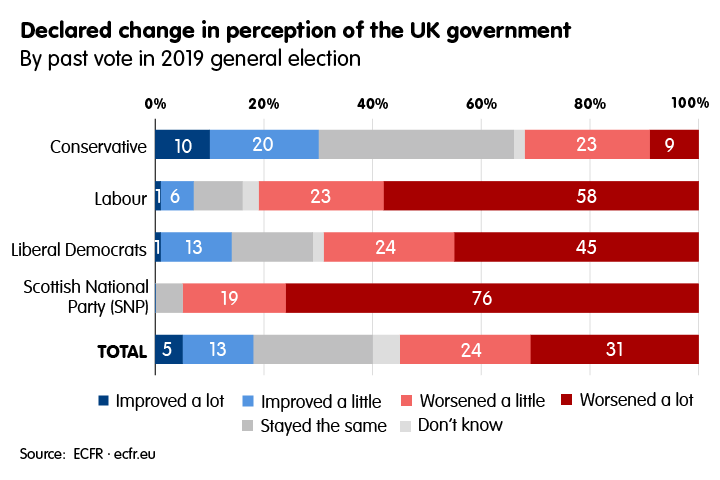
However, it also appears that the UK is emerging from a Brexit parenthesis. Unlike its EU neighbours, Britain has not existed in any ‘natural state’ of familiarly left-right, bread-and-butter politics for some time. The culture war reached its perhaps inevitable denouement when the long tail of one major disruption – the June 2016 referendum – tapered to an end with Britain finally leaving the EU in January 2020. Brexit was shortly followed by a second major disruption – covid-19, which has forced Britons to look at their government afresh. Voters expect their government to be competent enough to take control of matters whether times are bad or good. This means that the unusual tribal politics of 2016-2020 – bookended by the two big crises of the referendum and covid-19 – could be seen as a diversion from more volatile political competition between parties.
The end of the Brexit tribes? Post-Brexit Britain’s pragmatic internationalism
Britain is a long way from the next general election, which is due by 2024. But the government’s management of covid-19 may be leading the public to reassess their opinion not only of the people who govern them but also of the relative value of their own priorities. This could have a direct impact on the parties’ choices around strategy and policy over the next few years.
It is worth reflecting on some of the underlying currents that helped bring about Brexit. Attitudes towards international issues have often served as code for cultural divides in British politics. The journalist David Goodhart famously characterised a divide between lower-income “somewheres”, who are attached to the nation and feel threatened by globalisation; and more prosperous “anywheres”, who have a cosmopolitan outlook and see global contact as an opportunity. In the Brexit era of British politics, the Conservative Party under Johnson used its advocacy of “somewhere” values to take voters from the Labour Party, even though these same voters’ preferences on economic issues were actually closely aligned with Labour’s positions.
For the last four years, the overriding political story in the UK has been one of polarisation and tribalisation as the gap between somewhere and anywhere appeared to divide the country between old and young, towns and cities, north and south, non-graduates and graduates. Maps of voting trends in the 2016 referendum pointed to a divided Britain – and the demographic indicators that defined those tribes went on to have enormous electoral consequences at the 2019 election.
Many commentators expected – and Remainers hoped for – large numbers of voters to experience buyer’s remorse after the referendum, particularly as voters faced the danger of a “no-deal Brexit”. But the reality was often that voters interpreted the new cycle through the prism of their pre-existing views. Remarkably few people changed their minds. Four years on from the referendum, there is still little sign of a major rethink on Brexit: ECFR’s poll shows that 35 per cent of the population say it is a good thing, while 39 per cent say it is bad.
However, the findings suggest it is possible that the public is now moving beyond those tribal divisions. On many of the key issues polled, there is more that unites Remainers and Leavers than divides them. They continue to hold different attitudes towards the two main political parties – with Leavers being more sympathetic to Johnson and more likely to blame China (or individuals breaking social distancing rules) for covid-19 deaths, while Remainers are more positive about Starmer and more likely to blame the UK government. But, for the most part, both groups are sceptical of experts and the authorities, in favour of higher government spending and of increased wages for the lowest paid, and largely supportive of international cooperation in the face of the pandemic and climate change.
Perhaps most emblematic of the blurring of the boundary between the two tribes is the way that each is now thinking about freedom of movement – the ultimate dividing line during the Brexit years. ECFR’s survey found that, among both former Remainers and Leavers, more people support than oppose both tighter border controls and freedom of movement for health workers coming to the UK. Seventy-nine per cent of Remainers and 50 per cent of Leavers support freedom of movement for health workers, while only 19 per cent of Leavers oppose it.
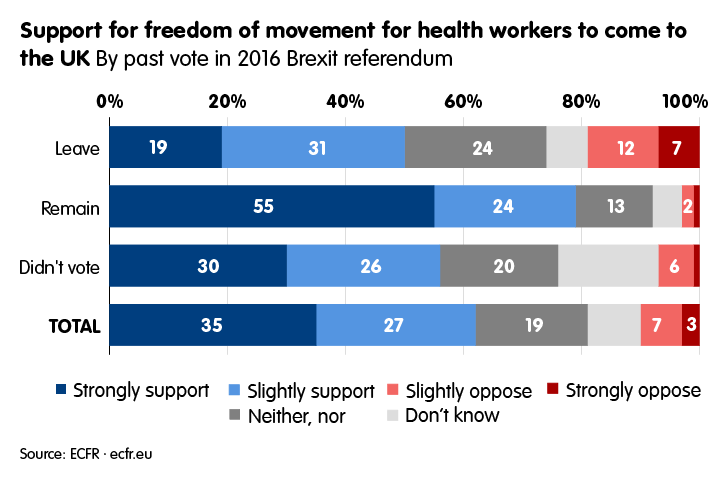
At the same time, stricter border controls are supported by 85 per cent of Leavers and 41 per cent of Remainers, while only 28 per cent of Remainers oppose them.
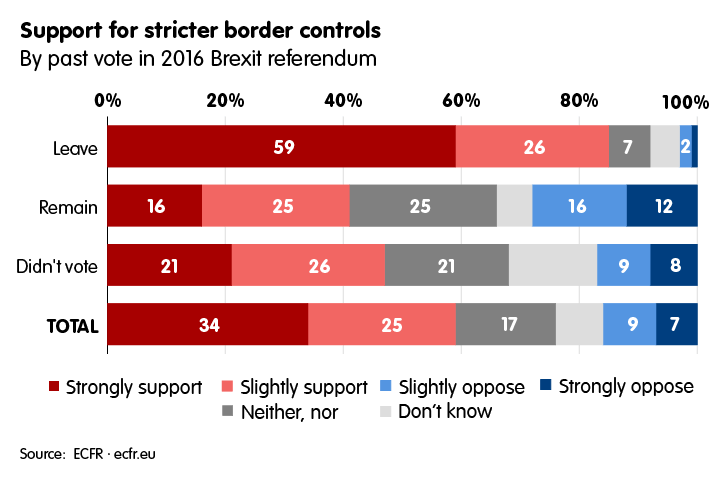
Many observers characterised the 2016 referendum as a choice between an outward-looking Great Britain and an isolationist Little England. And it is certainly true that, while some prominent Leavers had aspirations for a Britain open to the world, the emphasis during the referendum campaign and since then on closing borders, leaving the single market, and identity politics has meant that the net effect of the referendum was for the UK to turn inwards. Political debate became swamped by Brexit, EU citizens quit the country, and foreign investors withdrew.
However, one of the surprising impacts of covid-19 has been to illuminate the country’s commitment to internationalism. Sixty-six per cent say that covid-19 shows that there is a need for more international cooperation, while only 18 per cent say it shows globalisation has gone too far (and just 28 per cent of Conservative voters believe the latter). This is a natural response to the way that covid-19 emphasises the interdependence of the world – and the need to work together to survive. It has led a significant share of voters to feel cross-pressured between their Brexit identities and new issues pushed up the agenda by covid-19. Voters do not stay cross-pressured for long, so parties – if they want to remain relevant and retain or earn voters’ support – will have to move quickly to reposition themselves, frame certain issues differently, and potentially change the key narrative defining British politics.
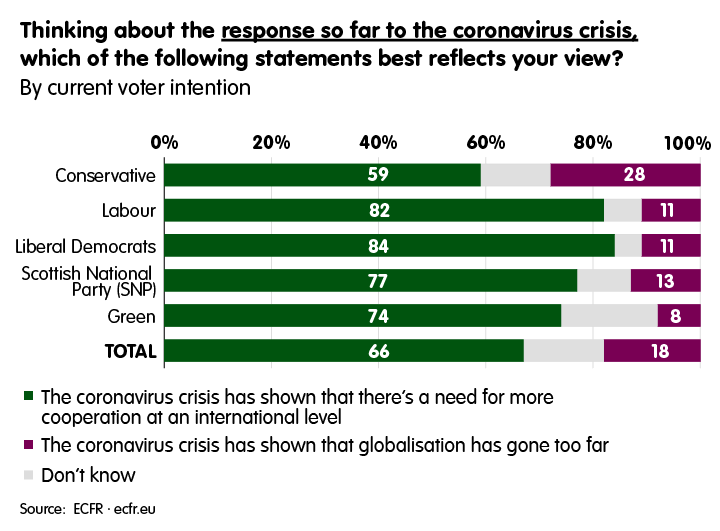
To find out more about the areas in which Britons believe their country should cooperate with partners internationally, ECFR’s survey presented respondents with a “ladder of internationalism”. This gave substance to what could otherwise be an abstract question. Unsurprisingly, it found that, at the height of the crisis, 86 per cent supported international scientific collaboration for finding a vaccine. Almost 70 per cent wanted to work together on ensuring good stocks of medical supplies. Nearly two-thirds support managing borders for international trade and cooperating on freedom of movement for health workers, with 53 per cent of Conservative voters and 84 per cent of Labour supporters backing the latter proposal. Smaller majorities favour working with other countries’ governments on managing borders to fill skills gaps (55 per cent), managing borders for tourism (60 per cent), and even on managing the economic recovery from the crisis (54 per cent). With a global crisis looming, there is a wide sense of the need to work with other countries to deal with global issues.
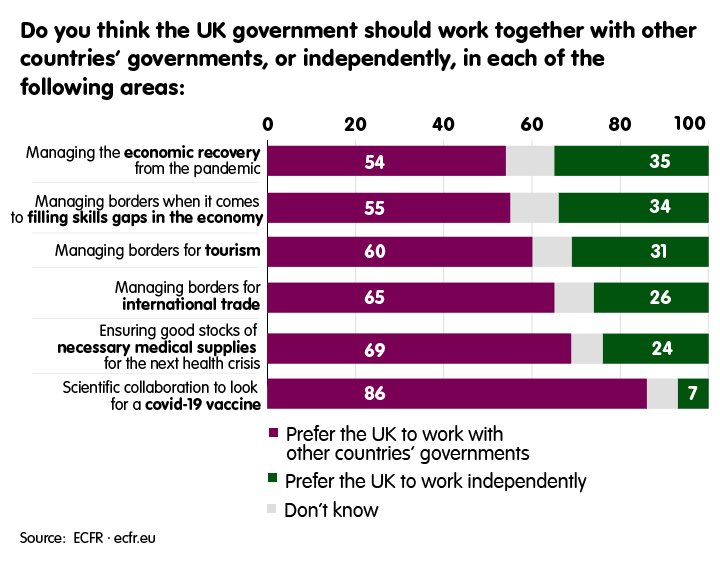
One of the most striking findings is that – in contrast to the global financial crisis – public support for tackling climate change has remained strong in the wake of covid-19. Sixty-two per cent want stronger action on climate change, while only 9 per cent do not. When ECFR delved further into this issue, 55 per cent said they agreed that “climate is like the pandemic and that we need to take action now”. Twenty-four per cent of all respondents think “it is nowhere near as urgent” and only 6 per cent think “climate is not a real problem”. Britons do not seem to harbour a desire to turn inwards.
One of the other dramatic effects of the covid-19 crisis has been to end some of the illusions that voters had about what the government has long dubbed “Global Britain” – the attempt under both Johnson and his predecessor, Theresa May, to reframe the country’s place in the world. Some Brexit campaigners argued that the UK could make common cause with the “Anglosphere” and use an enhanced transatlantic relationship as a substitute for the EU. But during the pandemic, two-thirds say that their opinion of the United States has worsened significantly, including majorities of 2019 Labour voters and Conservative voters – 80 per cent and 61 per cent respectively. And another commonly heard trope from Leavers in the past was that Europe is declining and that Britain should pin its future economic hopes on the rise of Asia, particularly China. But ECFR’s polling shows that 56 per cent of Britons report that their opinion of China has worsened during the crisis. Few say their view has improved: only 1 per cent of Conservatives say their perception of China has improved, and only 7 per cent of Labour supporters agree.
There is thus a stark contrast between British voters’ desire for greater international cooperation and their negative perceptions of many of the available international partners. It is possible that the collapse in perceptions of the US and China has exacerbated a sense of loneliness in the world – one that may even come to drive an acceptance that Europe is an ally of necessity. It is striking that the only external actor whose reputation has somewhat improved during the crisis in ECFR’s polling is Britain’s European neighbour, Germany. Indeed, opinions of Germany have improved for 28 per cent of all respondents, including 41 per cent of Labour voters – but also 21 per cent of Conservative voters. This shows some evidence of voters being cross-pressured between their conflicting desires for Brexit and closer cooperation with European partners.
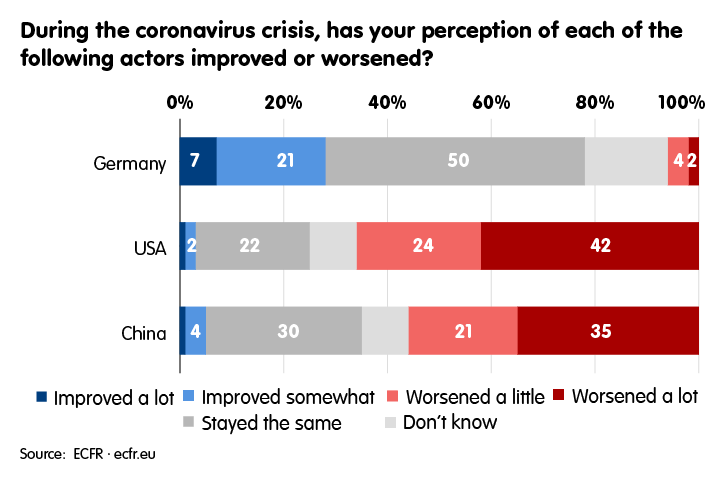
This echoes perceptions in other European countries, where many voters see a new case for European cooperation in a dangerous world. It is possible that in the UK – as the survey found elsewhere in Europe – covid-19 has revealed the importance of being able to protect supply chains for essential goods, with the logical conclusion that this means bringing essential parts of these chains back into Europe. While this is not necessarily going to change thinking about Leave and Remain, the unattractiveness of alternative partners has the potential to change the brinkmanship around the UK’s trade deal with the EU coming at the end of 2020 – if the British government recognises this. That said, the result of November’s US presidential election will have a profound impact, potentially encouraging the Conservatives to double down on nationalist isolationism if they perceive they now live in a world of countries fighting things out on their own.
A new progressive economic consensus?
As discussed above, in the Brexit era of British politics, Johnson’s Conservative party used its advocacy of “somewhere” values to take voters away from a Labour Party that was actually closer to these voters’ preferences on economic issues. In the 2019 election, this strategy worked so well that the Conservative Party established a 15-point lead among low-income voters – Labour managed to lose fully one-third of the low-income voters who had supported it in 2017. The need for the government to devise a covid-19 recovery plan that invests in the NHS, infrastructure, and tackling regional inequalities could present it with a real opportunity to keep the connection with voters who are content now that Brexit is “done” and looking for delivery on the levelling up agenda. One fascinating study, by the UK in a Changing Europe programme, showed that, had covid-19 not struck, this would have been a challenging feat to pull off because of a massive gap between the economic values and priorities of the Conservative Party’s new supporters and those of the party’s activists and members of parliament. They found that the economic values of these voters were much closer to those of Labour voters and Labour MPs.
ECFR’s polling suggests that covid-19 may have further widened the economic values gap between Conservative MPs and the electorate. The findings show that the crisis has shone a spotlight on structural inequality and led to strong support for progressive, redistributive policies among a large swathe of the electorate. For example, just under half of all respondents say they support higher government spending, including 44 per cent of Conservative voters; only 12 per cent of voters oppose more spending. At 79 per cent, there is overwhelming support for significantly increasing wages for NHS nurses and care workers, with 71 per cent of Conservative voters indicating their support for this measure (92 per cent among Labour voters). Backing for raising the wages of other key workers, such as supermarket employees and refuse collectors, is almost equally overwhelming: 73 per cent in total, and 61 per cent among Conservatives and 90 per cent among Labour. Just over two-thirds of all voters – 53 per cent of Conservatives and 85 per cent of Labour supporters – say they want an immediate increase in the national minimum wage to £10.50 an hour.
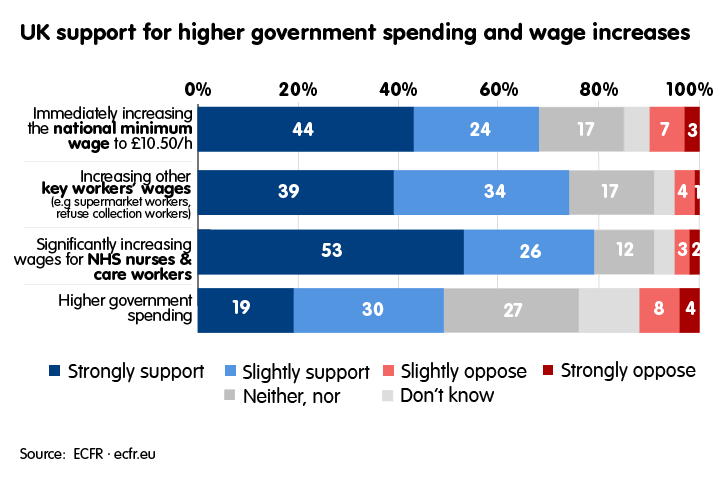
And this progressive consensus on the presence of structural inequalities – and the need for an interventionist state to tackle them – extends beyond spending priorities. The survey probed voters’ views on how to pay for this spending. While the global financial crisis led to a widespread belief in the need for austerity, covid-19 has provoked a very different response. Only 5 per cent of those surveyed choose cuts in public spending as one of the top three ways of paying for salary increases for key workers. Seventy-two per cent point to the need to crack down on tax avoidance, while 57 per cent back a 50 per cent income tax rate on those with an income of over £200,000. Forty-seven per cent support a “mansion tax” property charge, and 42 per cent a levy on multinationals.
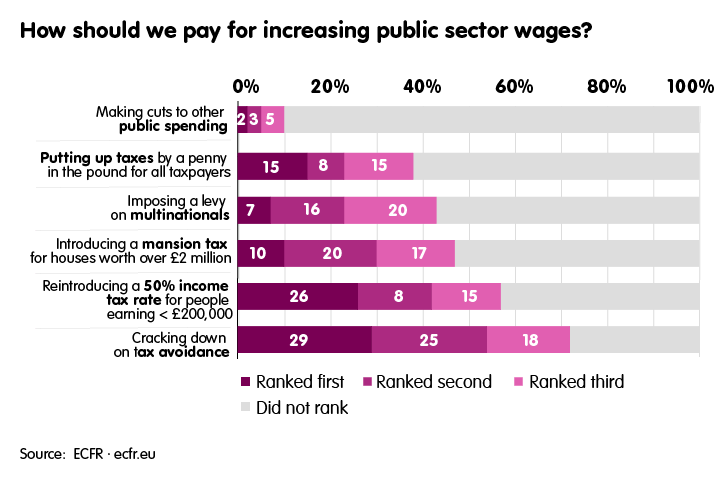
The Conservatives have not skimped on spending to sustain the country’s economy throughout the pandemic’s lockdown and its partial easing. But given the gap between their beliefs and those of the public – and the public’s keen interest in seeing politics as usual deliver for them – the government will find itself caught between the beliefs of its parliamentarians and of its voters, especially those in swing constituencies. The spending review and budget planned for this autumn will be important moments that reveal how – and whether – the government will settle these questions and the shape that the process of post-pandemic politics will take.
The battle for the future: Culture wars or peace between Brexit tribes?
New, post-pandemic volatility among voters will pose questions for both Labour and the Conservatives. What do the data say, and what do they mean for those most important of swing constituencies – the bricks in the former Red Wall?
There is some promising news for Labour. Firstly, Starmer has already managed to win back a substantial number of former Labour voters who abandoned the party in 2019 or before, including almost one in four of the Red Wall voters lost in 2019. The voters regained by Starmer’s Labour make up 8 per cent of respondents to ECFR’s poll and come from lots of different places, politically speaking. Over one-third come from the Liberal Democrats – and, indeed, more 2019 Liberal Democrat voters are now opting for Labour than are sticking with the Liberal Democrats. Importantly, one in five former Labour voters who have been won back voted Conservative in 2019, while one-third abstained. There is an open question about whether Labour will manage to recover ground in Scotland, where it was reduced to a single seat in the 2019 election. Although it is struggling to be heard as the debate rages on between the pro-independence Scottish National Party and the pro-union Conservatives, Starmer’s election has led some people to reconsider the Labour Party. ECFR’s poll showed that 12 per cent of voters who supported the Conservatives in 2019 and 43 per cent of 2019 SNP voters would consider Labour.
Secondly, the Conservative lead over Labour is down from 25 percentage points immediately after December’s election to 5 percentage points at the time of ECFR’s poll. Most Britons’ perception of their government has deteriorated throughout the crisis.
Thirdly, a clear majority of the public support a redistributive agenda at home and an internationalist agenda abroad – issues on which Labour has traditionally been strong.
There are grounds for Conservative celebration too. A large group of people who have voted Labour in the past (in at least one of the general elections of 2005, 2010, 2015, or 2017, but not in 2019) are still not considering voting Labour at the next election. This group makes up 10 per cent of the entire voting population and mostly consists of older voters. Just under one-third of them intend to vote Conservative, while just over half say they do not yet know which other party they will support. Conservative Party strategists seem to hope that they can reignite cultural issues in the run-up to the next election and retain their winning 2019 coalition: coverage of negotiations with Brussels supplies ongoing opportunities to do this, while debates around race and statues that have arisen in recent months also provide culture wars-style material for them. For instance, home secretary Priti Patel recently adopted an aggressive stance on immigration, policing, and the Black Lives Matter protests. Conservative London mayoral candidate Shaun Bailey has pledged to scrap the commission on historical statues set up by the sitting mayor of London, Sadiq Khan.
However, ECFR’s polling raises profound questions over whether these culture wars will prevent the post-Brexit demobilisation the Conservatives wish to avert. Crucial to this question – because they were crucial to Johnson’s December 2019 landslide victory – will be the Red Wall defectors. They make up only 6 per cent of respondents, but they are heavily overrepresented in the marginal constituencies that are decisive in the formation of governments. As noted above, almost one-quarter of this group currently say they intend to return to Labour, while the Conservatives have kept only one in five of them. However, the biggest group of Red Wall defectors – 46 per cent – is made up of voters who do not know who they will vote for or are considering not voting at all. Red Wall defectors are mostly older (69 per cent of them are older than 45).
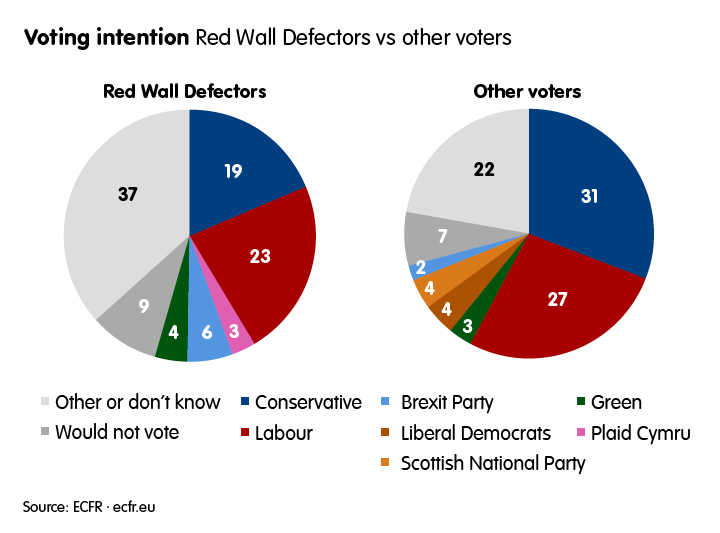
As the following shows, 50 per cent of Red Wall defectors have a worsened perception of the current government, which could mean they may be open to changing their mind about how to vote next time. At the same time, among Red Wall defectors, the Labour party’s image has not improved as much as it has among voters more generally. Like Leavers as a whole, they are also less likely to blame the government for covid-19 deaths; more Red Wall defectors blame the Chinese government, or people not following the rules.
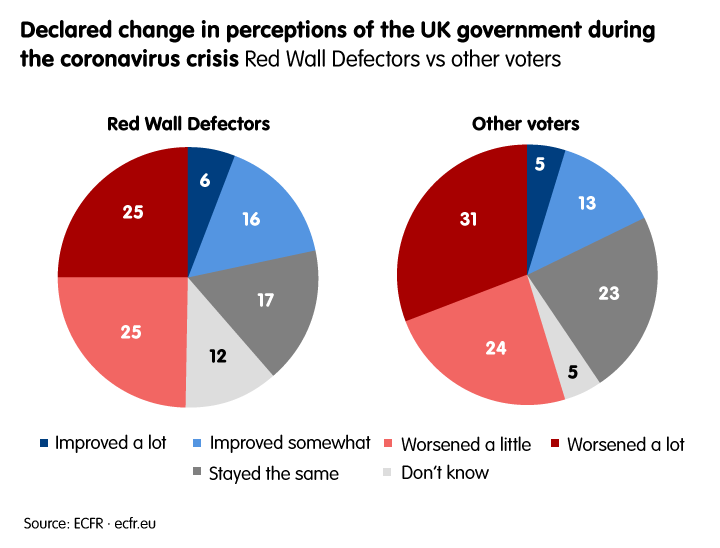
However, like the public at large, Red Wall defectors’ perceptions transcend some of the tribal divisions caused by Brexit. On cultural issues, members of this group are more closely aligned with Tory supporters, while their economic views are more similar to Labour voters’. ECFR’s polling also shows that Red Wall defectors seem to be embracing pragmatic internationalism abroad and a redistributive agenda at home. Sixty-one per cent of this group support more international cooperation and only 24 per cent think globalisation has gone too far. They support international cooperation not only in this abstract form but also when it comes to more concrete and sensitive examples. For example, 52 per cent of Red Wall defectors support freedom of movement for health workers and only 14 per cent oppose it (and the government now plans to introduce a health and care visa). If voters opted for Britain to take back control, politicians ought not to feel surprised that these same voters now expect to see this control in action. Devising a new post-Brexit policy agenda on how to manage relations with Europe, including setting out what the trade-offs are, is likely to be what Red Wall defectors expect of the Conservatives.
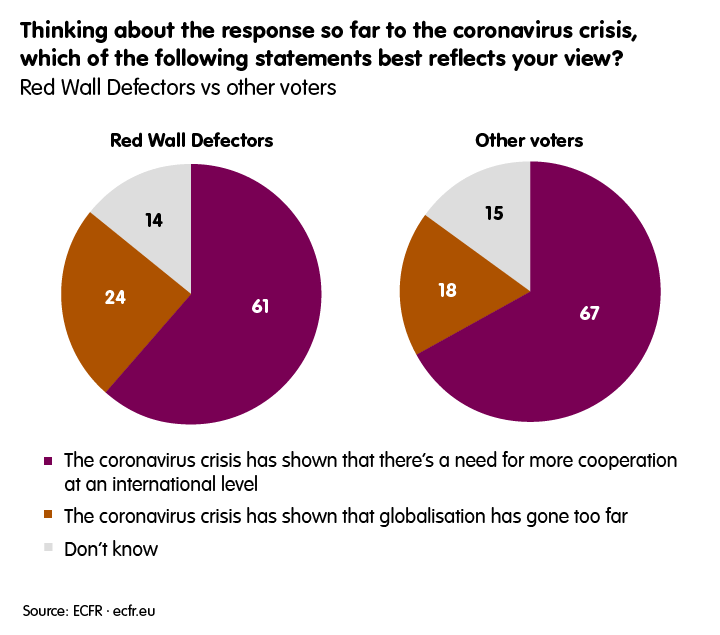
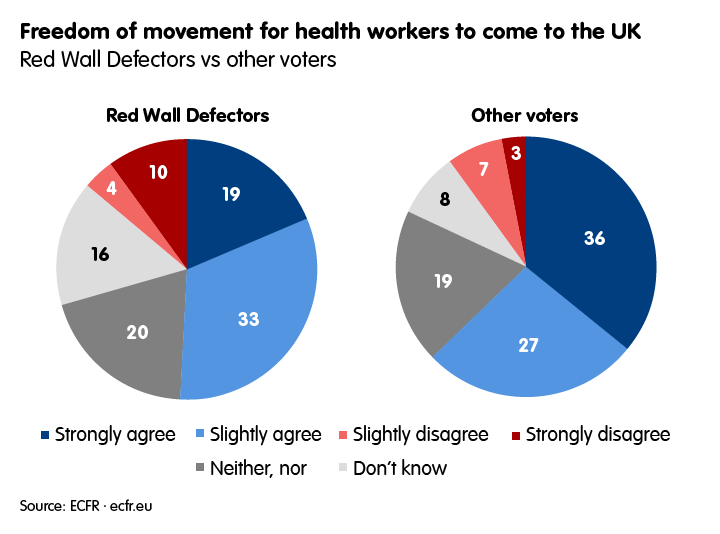
When it comes to the domestic agenda, Red Wall defectors appear more concerned about structural inequalities than most Conservative Party supporters. Eighty per cent support increased wages for NHS workers – less than Labour supporters (92 per cent) but more than Conservative supporters (71 per cent). A total of 73 per cent want to increase the minimum wage to £10.50 an hour – again, behind Labour supporters (at 85 per cent), but significantly ahead of Conservatives (53 per cent). When asked about how to pay for increased public sector wages, support for a 50 per cent rate of income tax for high earners is greater than the national average among Red Wall defectors. Part of the reason for this might be because Red Wall defectors are poorer than the national average.
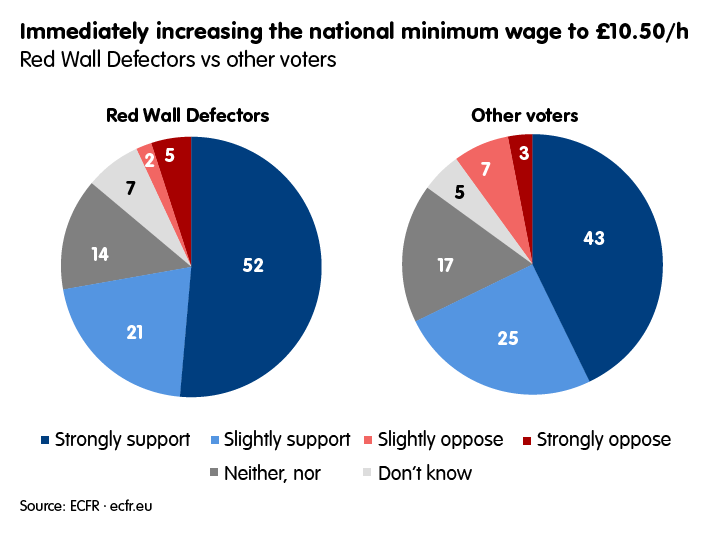
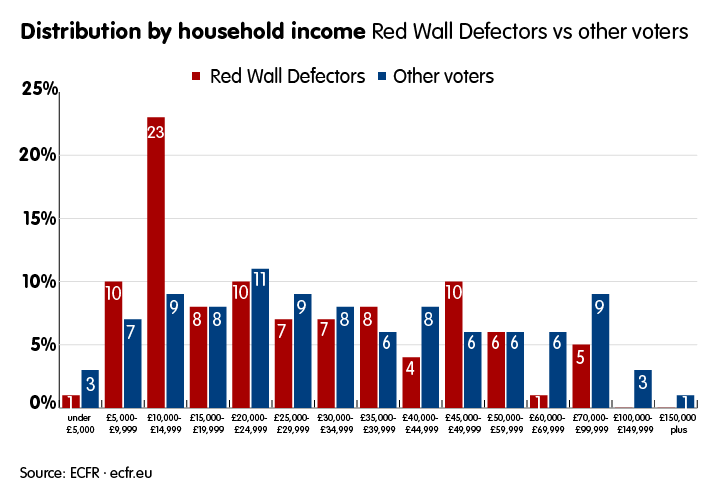
How the cross-pressures among these crucial voters resolve themselves in the years to come will – as they did at the general election and arguably at the 2016 referendum too – have a powerful impact on the future of the UK, its domestic politics and its place in Europe and the world.
Conclusion: Out with the old
Black Wednesday unleashed the demons of Euroscepticism for the Conservatives and opened the way for a new political divide on Europe that culminated in the 2016 referendum; covid-19 has the potential to replace the nationalism of Brexit with a politics of pragmatic international cooperation abroad and tackling structural inequalities at home. While much of the pain of the looming recession still lies in the future – and it could be deeply painful – the crisis of 2020 could, paradoxically, lead to normal politics even in abnormal times.
The tribal divisions between Leavers and Remainers may not necessarily erode now that Brexit is over. The scale of covid-19 appears to be raising the profile of new political issues that cut across voters’ existing partisan identities, confronting cross-pressured voters with their internal contradictions. But whether new identities will form and how they connect to the parties remains unknown. For Boris Johnson and his Conservatives, the fading of Brexit and the arrival of coronavirus represent a threat to their newly forged electoral coalition. For this reason, their response is likely to be to try to repolarise society around cultural schisms, seizing and weaponising the next steps of Brexit, arguments around statues, and the politics of law and order, history, and race. It is more than possible to imagine the Conservative Party trying to shift responsibility for the crisis onto expert advisers, civil servants, care home workers, and other groups while continuing to find ways of appealing to swing voters through culture wars and its levelling up strategy.
But if voters reassess what matters to them in a fundamental way, political parties that successfully reposition themselves or reframe certain issues will be able to capture votes in the context of this new alignment. Crucially, ECFR’s findings suggest that the power of these cultural questions could well diminish. The shock of the pandemic has brought fundamental questions of competence to the fore. There now appears to be greater support among the British public for a redistributive agenda, as key voting groups such as the Red Wall defectors find themselves in economic distress. And, importantly, rather than supporting isolationism, these important groups also express support for a pragmatic internationalist agenda. Taken together, a new era of political competition may be beginning – and marking the end of the Brexit parenthesis.
Methodology
This paper is based on a public opinion poll carried out by YouGov for Datapraxis and ECFR between 26-27 May 2020, with a nationally representative sample of 2,029 respondents recruited from YouGov’s online panel. The sample includes political as well as demographic quotas and weighting.
About the author
Mark Leonard is co-founder and director of the European Council on Foreign Relations. He is the author of Why Europe Will Run the 21st Century and What Does China Think?, and the editor of Connectivity Wars. He presents ECFR’s weekly World in 30 Minutes podcast.
Acknowledgements
I am very grateful to Douglas Alexander, Sunder Katwala, Adam Lury, and Neil O’Brien MP for interesting discussions about the trends revealed in the data. I would like to thank Paul Hilder and his team at Datapraxis for their work analysing the dataset and to YouGov for conducting the fieldwork. Philipp Dreyer was responsible for the data analysis and allowed us to learn many things from it. Lucie Haupenthal was the perfect partner throughout the writing process. Jeremy Shapiro, Susi Dennison, and Swantje Green gave valuable feedback on earlier drafts. Adam Harrison has been an exemplary editor and intellectual sparring partner, helping bring much greater order and coherence to the thinking in this paper. Thanks to Susanne Baumann and Susi Dennison for their leadership of the Unlock project. Franziska Brantner, Ismaël Emelien, Lykke Friis, Adam Lury, and Alex Soros all provided amazing insights, ideas, and advice on every aspect of ECFR’s polling work. Despite all these many and varied inputs, any errors in the report remain the author’s own.
The European Council on Foreign Relations does not take collective positions. ECFR publications only represent the views of their individual authors.

